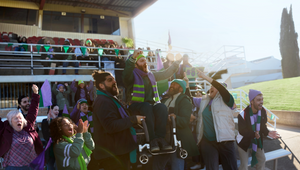
“If We Step Too Quietly, We Won't Create Meaningful Change”: How Big W, Thinkerbell, and Bupa Are Championing Inclusive Production

From Nine’s historic Paralympic coverage to Big W’s commitment to accessible advertising, brands and agencies are striving to embed inclusion in its practices - not just because it’s the right thing to do, but because it has transformative creative and commercial impact.
Nine’s 2024 Paralympic broadcast was the first fully Inclusively Made certified production, while retailer Big W committed to certifying all its major campaigns this year.
Vanessa Rowed, marketing director at Big W, says the company’s ambition is rooted in a belief that inclusion should be standard practice.
"We made a commitment that all Big W productions should be Inclusively Made certified, because it should just be good business," she says, speaking ahead of today’s International Day of People with Disability.
"If we set that ambition from the start, even getting halfway there means real progress.
"But if we step too quietly or lightly into this space, we won't create meaningful change."
Big W’s commitment is mirrored by parent company Woolworths, which ensured its Olympics and Paralympics campaigns met inclusive production standards.
Creative agencies such as Thinkerbell are also embracing the challenge of inclusive storytelling.
"As an agency, we have a responsibility to ensure everything we put into the world truly represents all Australians," CEO Margie Reid says.
"Inclusion isn't just a checkbox — it's about accurately reflecting who we are as a society in the content we create and how it's created."
Jim Ingram, chief creative officer and co-founder of Thinkerbell, adds the agency’s focus has been on learning and maintaining momentum.
"The journey to becoming more inclusive has taught us that it's not about knowing everything from day one," he says.
"It's about building strong partnerships, maintaining momentum, and committing to doing better with every project.
"The more we learn, the more impact we can have."
Bupa has also embraced inclusivity, with its campaigns demonstrating the value of collaboration and authenticity.
"The more I find out about inclusive communication, the more I realise there's always more to learn," Naomi Driver, general manager marketing, says.
"It's not about being an expert — it’s about having the willingness to go on the journey and acknowledging across our business that while we might sometimes get it wrong, each step brings us closer to truly inclusive communication."
Naomi adds that inclusive communication has led to unexpected opportunities for the business.
"For us, inclusive communication isn’t just about following a formula — it’s about having the confidence to engage authentically while being receptive to learning along the way," she says.
"This mindset has opened up opportunities we never expected and led to some of our most impactful work."
Central to this shift is the "I'm In" movement, a collective effort to unite teams across Big W, Woolworths, Nine, Bupa, Thinkerbell, and others.
Participants wear limited-edition shirts featuring artwork by Archibald Prize finalist Digby Webster, a symbol of the industry’s commitment to dismantling ableist attitudes and embedding inclusion into every stage of production.
Vanessa highlights the importance of fostering a supportive environment for teams to embrace inclusivity.
"What we've learned is that making content inclusive isn't hard at all with the right support and partners," she says.
"The team might be nervous about getting things wrong, but when you embrace that there are no silly questions and create a space for learning, it frees everybody up to focus on doing what's right rather than being paralysed by the fear of doing it wrong."
Paul Nunnari, CEO of Inclusively Made, says the impact of inclusive production goes far beyond meeting standards.
"When you include people with disability both in front of and behind the camera, you get better stories, more authentic representations, and ultimately, more impactful work," he says.
As the industry continues to evolve, its leaders are committed to ensuring inclusion becomes the norm rather than the exception.
"Every certified production, every inclusive hire, every accessible set brings us closer to our goal of making inclusion business as usual," Paul says.
"The momentum is building, and there’s no going back."
















